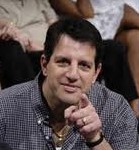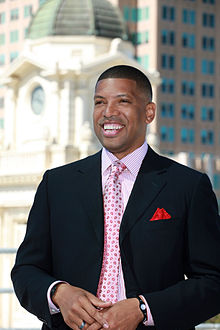 After 18 roller-coaster months, the bumpy search for Billy Hunter’s replacement as executive director of the NBA Players Association seems ready to reach its conclusion. The drama will not end easily.
After 18 roller-coaster months, the bumpy search for Billy Hunter’s replacement as executive director of the NBA Players Association seems ready to reach its conclusion. The drama will not end easily.
Even a few days before the final candidate presentations and vote, turmoil reigns as different factions try to impose their respective wills on the process.
What this excruciating process has exposed is that the search for the union head is really about who has control over the players.
It’s certainly not the players. They have voluntarily given their power away.
When the union was founded in the 1960s, a small group of stars led by Oscar Robertson and a few others knew that the players needed to wrest power and control from the owners. Benefits were few, salaries were low, and players just went where they were told.
Then the 1970s became the age of the agent. Players started being represented by agents and turned to them for all kinds of advice and support. By the 1980s, the agents had taken over. Even the union head – Larry Fleisher – was a working agent.
By the time the Hunter era began, all union decisions were made by a few players willing to take charge of things. The rest of the players would merely ask their agents what they should do. But what else can you expect? All players are young and unsophisticated in business matters when they enter the league. That’s why you hire an agent – to be your advisor in these matters.
But the agents know that you will be gone soon and they will still be here. So they look for more and more control.
As a player guy, this year I felt very strongly that players were being managed during the search for Hunter’s replacement. I exposed all of the ways that I saw them being manipulated to generate a certain outcome. In the end, the search was redone.
 The Executive Committee did what at the time seemed like a smart thing: They asked the mercurial Kevin Johnson to lead a Dream Team advisory committee. Fresh from saving the Sacramento Kings, Johnson was a powerful figure. As a former player turned mayor, he could do no wrong.
The Executive Committee did what at the time seemed like a smart thing: They asked the mercurial Kevin Johnson to lead a Dream Team advisory committee. Fresh from saving the Sacramento Kings, Johnson was a powerful figure. As a former player turned mayor, he could do no wrong.
But what the players learned was that when you bring in such a powerful person to run things, he runs things. You are out. They had essentially given him the authority to pick their next leader.
Oh, as long as you agree on stuff, it seems like you are all working together. But as we all know, when you disagree, you find out who is really in charge.
That hit the fan this week when the final candidates were being selected. Many insider accounts described a blow-up between Johnson and the players over final control of the process. Johnson seemed in charge until the final step, then decided to withdraw from the process, taking his committee and going home. But even the committee was caught unaware, and several members were unaware of the withdrawal.
So who is calling the shots? Who won the battle? And why is it so hard for the players to be in charge of their own destiny?
Clearly, Johnson and the committee controlled the selection of the final candidates. Clearly, the agents are exerting their will at every opportunity, possibly even having one of their own get the job. There is even a candidate trying to crash the party by enlisting players to invite him to address the players meeting as essentially a write-in candidate.
The 2014-15 season is about three months away, and Donald Sterling still has not been officially removed as owner of the Los Angeles Clippers, which nearly prompted the boycott of a nationally televised playoff game. His continued presence would demand some sort of job action by the players that requires intelligent leadership.
On the horizon is a new TV contract in 2016 which some already are saying could double in value. That would  dramatically impact the union’s position a year later, when both labor and management have the ability to opt out of the current CBA. Given the beating the players took in the last negotiation and the booming business the NBA has become since, it is a virtual certainty that they will be trying to recoup some of their losses.
dramatically impact the union’s position a year later, when both labor and management have the ability to opt out of the current CBA. Given the beating the players took in the last negotiation and the booming business the NBA has become since, it is a virtual certainty that they will be trying to recoup some of their losses.
The bottom line is that all of the drama is the result of the traditional power vacuum left by the players at their own invitation. And in many ways, players are powerless to stop it. They are young and inexperienced. The issues are complex. They are trained to rely on their agents and advisors. As long as the checks roll in, who cares about the other stuff? They rarely take control of their lives. Hunter did little to change it. After all, why give up his control?
All of the people I talked to expected a turnout of about 120 players at the meeting in Las Vegas this weekend. The union will try to explain how that is a pretty good turnout.
But what that really means is that nearly 75 percent of the players have something more important to do than spend a few hours picking the person who will lead them for the next decade or more and who will negotiate their next collective bargaining agreement. The union will try to explain why that is a pretty good turnout.
Until the players get the message that they can be a real power, they will continue to get what they get. And in this case, they’ve got a mess on their hands after Johnson threw his hands up and walked away.
This is a shame.
Danny Schayes is a retired 18-year-veteran of the NBA, a professional broadcaster and soon-to-be-published author now penning NBA columns for SheridanHoops. Follow him on Twitter.
MORE FROM DANNY SCHAYES:
THE END OF TWO ERAS FOR SPURS AND HEAT
HUNTER PLAYED RACE CARD AS HEAD OF PLAYERS ASSOCIATION
WHY A SEVEN-GAME SERIES EXPOSES CHARACTER
DONALD STERLING IS A SCHMUCK, BUT WE ALREADY KNEW THAT
WHAT PLAYERS CAN LEARN FROM DONALD STERLING
HOW PLAYERS HANDLE THE UPS AND DOWNS OF A PLAYOFF SERIES
UNION’S SEARCH FOR A NEW EXECUTIVE DIRECTOR; PART II
RAISING AGE LIMIT TO 21 IS A BAD IDEA, AND SOMEBODY SHOULD SAY SO
BASKETBALL VS. MARKETING: IS THE TAIL WAGGING THE DOG?
WHERE IS THE LOVE? SAG LAWYER AMONG CANDIDATES TO REPLACE HUNTER
ARE NBA PLAYERS GETTING PLAYED AGAIN AS UNION HUNTS FOR NEW CHIEF?
I just read this, and I’m still trying to ascertain the tone and the underlying meaning. Are you saying that Johnson was being entirely self-serving and trying to further grease the skids for his future political career? Which obviously one day includes a run for Governor. Are you accusing Johnson of looking out for himself instead of the players he purported to represent?
I just read this, and I’m still trying to ascertain the tone and the underlying meaning. Are you saying that Johnson was being entirely self-serving and trying to further grease the skids for his future political career? Which obviously one day includes a run for Governor.
I just read this, and I’m still trying to ascertain the tone and the underlying meaning. Are you saying that Johnson was being entirely self-serving and trying to further grease the skids for his future political career? Which obviously one day includes a run for Governor.
Seems like this article is like many of the others when talking about professional sports pre late 70’s, when you talk about players going where they were told and about low pay, are you so young or uneducated that you are unaware about when and how free agency started, or the role Curt Flood had in unchaining professional athletes from slave like conditions, where the only recourse a player had if they wanted to be traded or have a new contract was too refuse to play by sitting out, even in the early 80’s when Sterling bought the Clippers much of the older overseer mentality still existed, kind of like the doctor I knew who spent a couple of months each summer in South Africa where he could still have his “slaves. When Sterling bought his stable of black players he probably wasn’t the only owner who felt that way, and is likely a reason that the NBA hopes they never have to go to trial.